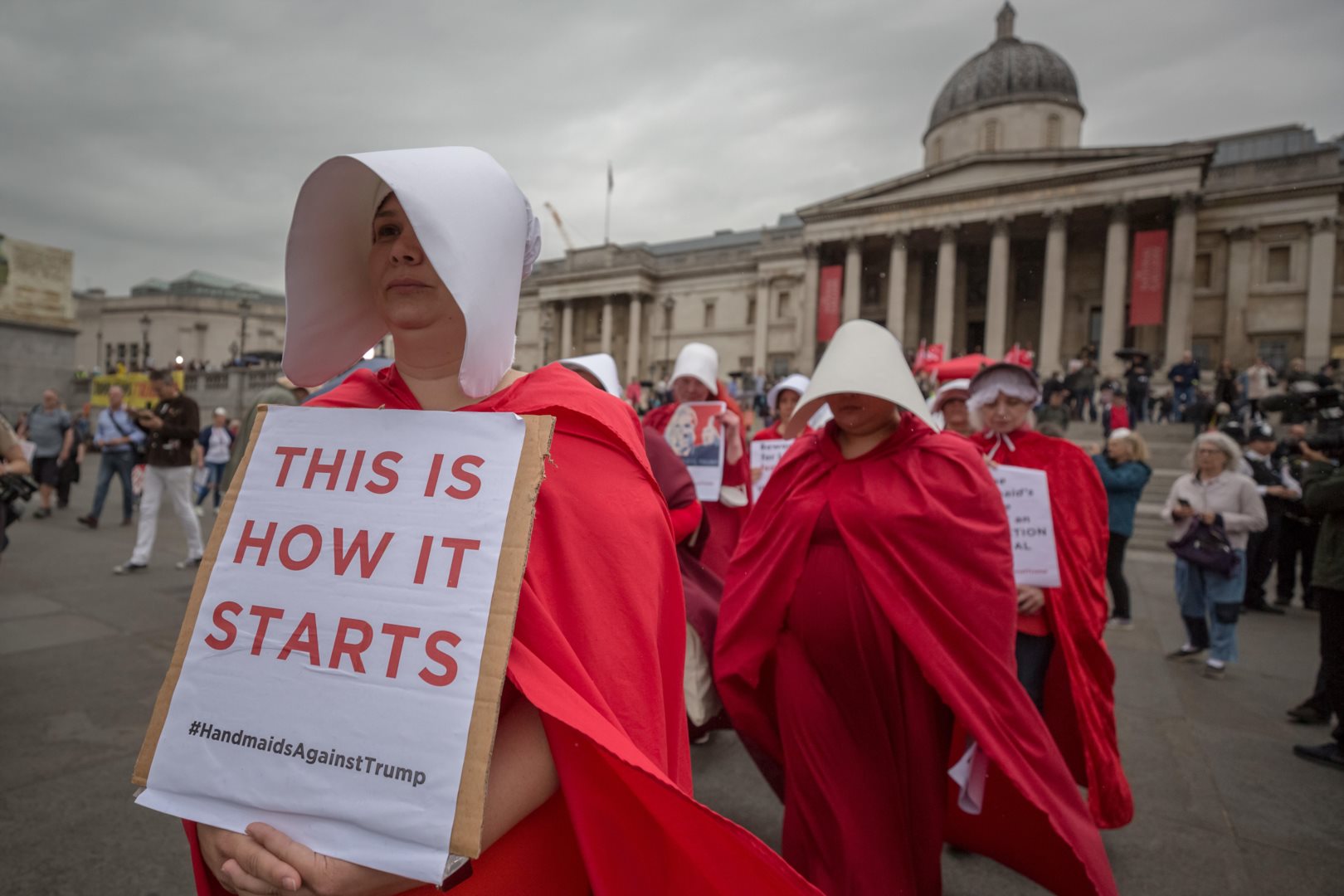Political Discourse
Not Everyone Who Disagrees with You Is An ‘Uncle Tom’
No one has an obligation to express, or refrain from expressing, a particular view, merely because they are part of a minority group.

Uncle Tom. Aunt Jemima. Judas. Aunt Lydia. Kapo. Self-hating Jew. Banana. Oreo. Quisling. Traitor. Sell-out. These are all pejoratives used to refer to someone accused of betrayal. Judas betrayed Jesus for money; Aunt Lydia betrays women for power; Uncle Tom betrays black people for his own protection.
Actually, I’m not sure what Uncle Tom betrays black people for. To know that, I’d have to have seen one of the lost plays that adapted Harriet Beecher Stowe’s famous novel for the stage, and in doing so entirely distorted the character of its main protagonist. In the original book, Uncle Tom is a man of remarkable faith and integrity. (Indeed, there are strong parallels between Uncle Tom’s story and Jesus’s.) Far from betraying other members of his race for his own protection, Uncle Tom refuses to disclose the whereabouts of two escaped women slaves and is brutally beaten for doing so—a beating that eventually results in his death.
There are black characters in the novel who would have been better symbols of the race-traitor archetype, although they make only fleeting appearances. Sambo and Quimbo for example, introduced somewhat late in the narrative, are the black overseers of a plantation. They use violence and intimidation to implement their white master’s directives: forcing the other slaves to work to the point of exhaustion and incapacity, knowing the master will simply buy new slaves to replace them if they die as a result.
Still, it seems unlikely that mere literary accuracy will be enough to see ‘Uncle Tom’ replaced with ‘Quimbo’ whenever anyone wants to talk about the concept that ‘Uncle Tom’ has come to embody. I want us to think more carefully about when someone actually is an ‘Uncle Tom’ (or a Judas, Aunt Lydia, etc.) and whether the phenomenon is as common as the proliferation of these pejoratives would suggest.

Except for ‘Judas,’ these pejoratives all refer to members of marginalized groups whose words or actions fall foul of the marginalized group’s majority (or vocal minority) politics. The usual accusation is that those targeted fail to hold the line in some way. An ‘Aunt Lydia’ fails according to feminist principles as to how women should relate to other women and advocate for women’s interests. ‘Self-hating Jews’ may refuse to take a stand on, say, whether the Jewish people have a right to a homeland. ‘Banana’ and ‘Oreo’ refer, respectively, to Asian and Black people who are accused of being “white on the inside,” meaning that they have assimilated into white culture or conformed to white standards, rather than remaining true to “who they really are.” Within gender-critical feminism—the minority group politics I know best—women who prop up patriarchy by cheerleading for the sex industry or for gender identity activism are sometimes called “handmaidens”—another reference, along with ‘Aunt Lydia,’ to Margaret Atwood’s fictional dystopia of Gilead (although this is a little unfair to the book’s actual handmaidens, who are, after all, slaves who will be hanged if they step out of line).
There are two separate questions here. One is whether these concepts are fair to their literary or historical namesakes, where these exist.
For example, a ‘Kapo’ was a Jewish person in a concentration camp given special responsibilities and corresponding privileges relative to other Jews. An ‘Uncle Tom’ (really, a ‘Quimbo’) was an African American slave willing to mistreat other slaves in order to reap certain privileges from white slaveowners. Do we really want to moralize about what people do in desperate circumstances, living in a perpetual state of fear and under a regime of arbitrary violence? We can recognize and respect the integrity of a person who refuses to accept an offer like this, without castigating those who do accept it. Would we ourselves have done better under the same extreme pressures?

The other, more interesting question is whether the way these concepts are used today is usually fair to the people they’re used against. Are the American cultural commentators Thomas Sowell and Candace Owens ‘Uncle Toms’ or ‘Aunt Jemimas’ just because they take dissident positions on race in America, while being black? Is the Indigenous Australian Senator Jacinta Price an ‘Aunt Jemima’ just because she campaigned for a ‘No’ vote in the recent referendum on the Indigenous Voice to Parliament? Are the members of the group Jewish Voice for Labour ‘self-hating Jews’ because they recently maintained that “Jewish organizations alleging antisemitism [in the British Labour Party] were acting in bad faith in order to suppress anti-Zionist activism”? Are Christina Hoff Sommers, Bettina Arndt, and Camille Paglia ‘Aunt Lydias’ because they criticize feminists, and give airtime to men’s rights issues? Do Black and Asian people really have to feel a certain way on specific issues—or be referred to with food metaphors that invoke the idea of being “white on the inside”?
The philosopher Connor Kianpour discusses some of these questions in a recent paper with the pleasing title “The Minority Retort.” Kianpour argues that members of minority groups have no obligation to express political views favoured by the group, and that we are wrong to punish them for not doing so. He starts with a case that will be familiar to those of us who have paid any attention to ‘cancel culture’ over the last few years:
Suppose you have a gay friend named Todd who expresses views one would not typically expect a gay man to express. He might lament the sexual promiscuity of other gay men and believe that their sexual liberation comes at the cost of their virtue. One day, Todd publishes a think piece in defence of this position. A critic of Todd’s article reads it and comments: “Gay men shouldn’t be saying things like this.” Many agree with Todd’s critic. After publishing his article, Todd begins to feel unwelcome in LGBT+ spaces where he once was embraced with open arms and is ridiculed publicly by people who were once perfectly civil toward him. … Todd, however, could just as easily be Sara, a black woman who condemns the Black Lives Matter movement, or Lisa, a woman who proudly states that a woman’s place is in the home.
Kianpour calls the expectation that members of unorganised minority groups should refrain from expressing specific ideas the defection thesis. That is, it counts as a “defection” from the group’s politics to express particular views, and that’s why the individual shouldn’t do it. (The difference between an unorganized and an organized minority group is the difference between women and Women’s Liberation Front (WoLF). WoLF have a manifesto and voluntary membership, so the concept of defection makes more sense there.) Those who believe in the defection thesis think that African American, Aboriginal Australian, Jewish, female, or Asian individuals, say, should express certain political views and should not express others—precisely because those individuals are African American, Aboriginal Australian, Jewish, female, Asian, etc.
Kianpour goes through a bunch of possible arguments in favour of the defection thesis and shows that they all fail.
The arguments he considers include what he calls “the role model argument,” “the gratitude argument,” and “the solidarity argument.” The role model argument sees each member of the minority group as a role model for that group; the gratitude argument thinks minority group members owe it to their group not to defect because of the gratitude due to past activists who have sacrificed for the interests of the group; and the solidarity argument views non-defection as a requirement of collective action against oppression, a way for individual group members to do their part.
I’d like to say a bit more about the role model argument here. (Those who want to know more about the other two should consult Kianpour’s paper, which is open access and very accessibly written.)

The role model argument says that members of unorganized minority groups should be good role models for others in the group. Defection is bad because it “expresses … indifference to the damaging influence they have on others in and beyond their group.” People outside the group may take the dissident individual’s views to be representative of the group, and that may lead to political inaction where there should be political action, in that group’s interests. A good way to try to prevent your dissident views from being weaponized to hurt your group is to simply shut up about them.
Kianpour finds the role model argument unsatisfactory on the grounds that there is no individual obligation to be a good role model for others in your group (granting, for the sake of argument, that being a dissident makes you a bad role model—although he takes issue with this claim later in the paper). Only those people who have put themselves forward as role models have an obligation to be good role models. Merely being a member of a minority group is not enough to confer such an obligation: that would be a violation of the individual’s freedom of expression. It would also be unfair to members of minority groups as a whole, since they would be prevented from expressing certain ideas, while members of dominant groups would remain free to explore and express any and all ideas. As for the dissident ideas being weaponized: we should blame those doing the weaponizing, not the dissidents themselves.
Kianpour focuses on whether dissidents like the hypothetical Todd or the real Thomas Sowell, Shelby Steele, Camille Paglia, and Andrew Sullivan (all mentioned in the paper) are violating an obligation to the minority groups to which they belong. Another question we might consider, though, is how confident we can be that a dissident is an Aunt Lydia, etc. Suppose Kianpour is right, and no one has a particular obligation to express, or refrain from expressing, a particular view, merely because they are part of a minority group. And suppose we come across someone with dissident views relative to their minority group, and our own politics are in line with the orthodox (or what Kianpour calls the “conformists”) of that group. Surely, we need to know whether the person is sincere in their views, or is a genuine sell-out, grifter, or “useful idiot”—parroting the dominant view in exchange for monetary or other rewards. Quislings do exist; arguably, Vidkun Quisling himself was one. But is there any way to be confident about who is a quisling, and who isn’t?
I first started wondering about this—and ended up reading Uncle Tom’s Cabin and finding Kianpour’s work—while preparing to interview the law professor Nadine Strossen. While reading Strossen’s 1995 book Defending Pornography, I came across the following quotation from radical feminist law professor Catharine MacKinnon:
The labour movement had its scabs, the slavery movement had its Uncle Toms and Oreo cookies, and we have FACT.
FACT was the Feminist Anti-Censorship Taskforce, a group of feminists against the censorship of pornography, of which Strossen was a member. MacKinnon was characterising those fighting for pornography, who she referred to as “liberal, so-called feminists,” as the Uncle Toms of patriarchy. (In MacKinnon’s view, to oppose the censorship of pornography was equivalent to supporting pornography; in our interview, Strossen disagreed.)
I myself have been accused of being a “puppet” for the right, for arguing against the claim that “trans women are women.” Might someone like Strossen (or I) present herself as a heterodox member of her minority group, unfairly persecuted by other group members (and non-member “progressives” besides)—and yet really be a useful idiot?
This surely depends on whether we care only about whether a person is being used by others, or also/instead about whether they are sincere and have been epistemically responsible in coming to their views. In other words, is someone an ‘Uncle Tom’ because of the outcomes of their speech or actions, or only because of their intentions in speaking or acting? If we only care that a person is used by others, then we can direct all the insults we like at the members of minority groups who don’t agree with the majority (or vocal minority). For some of those individuals will always be used by others who disagree with the group’s politics: look, here’s a black/gay/female person who agrees with us! So, we’re not racist/homophobic/sexist!
I think it makes more sense to reserve these terms for people who we genuinely believe to be selling out: they had certain conscious intentions and made certain deliberate trade-offs. But to determine this, we need to look carefully at what that person is getting out of what they’re doing; whether the benefits outweigh the costs for them; whether they’ve been consistent over time (or there’s a plausible reason for inconsistency, such as a genuine change of mind); and whether they can offer strong reasons in support of their position.
I was taken aback a few years ago when, at a workshop in the UK, a fellow philosopher breezily remarked that the multiple attempted cancellations I’d endured had surely been worth it for the name recognition I now had within the discipline. It hadn’t occurred to me that anyone would assume that the benefits of being a “cancelled” academic outweigh the costs. If that were true, people might deliberately get themselves cancelled in order to access those benefits. (A recent paper showing that citations decrease when an academic becomes controversial suggests that name recognition alone is unlikely to lead to the kinds of benefits academics normally care about).
Of course, these things have to be judged on a case-by-case basis. We could discuss every individual who has been targeted with one of the pejoratives I listed at the start of this article. But my guess is that almost all these individuals are acting in a principled way; they are exercising their right to be freethinkers, rather than mere minions for a group project. (It is one thing to reflectively endorse a group’s politics, and quite another to simply go along with it because you have been told to and are fearful of the consequences if you don’t.)
Almost all the minority group dissidents have probably paid far more in costs—given the social ostracism meted out to dissidents by the minority group itself and the castigation of such dissidents by “progressives”—than they have gained in benefits.
So, perhaps it’s time to retire the “Uncle Tom” insult, and its relatives, for good. We can argue that someone is wrong based on the content of their ideas, rather than what we think their ideas “should be” in light of their minority group status.






